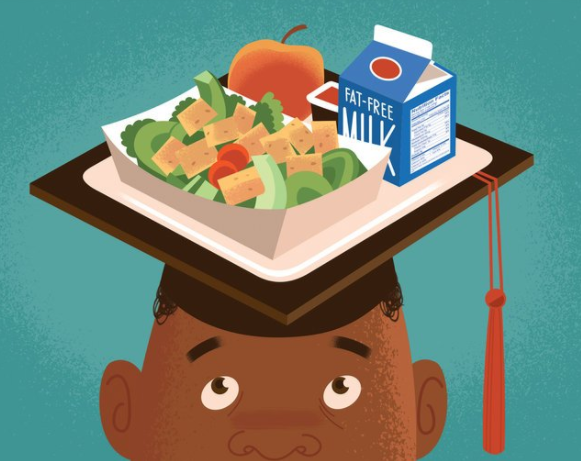Providing adequate amounts of nutritious food for school children is more important than many realize. Students who eat regular, healthy meals are less likely to be tired, are more attentive in class, and retain more information.
Nutrition can affect learning through three channels: physical development (e.g., sight), cognition (e.g., concentration, memory), and behavior (e.g., hyperactivity).For example, diets high in trans and saturated fats have a negative impact on learning and memory, reducing substances in the body that support cognitive processing and increasing the risk of neurological dysfunction.
Eating three meals daily (starting with a hearty breakfast, as breakfast sets your metabolism for the day), and 2-3 snacks daily is the best way to keep you properly energized and satisfied. Eating or not eating affects hormone levels that can cause muscle loss as well, so it is extremely important NOT to skip meals. Healthy snacking, especially before practices or games, is also important. This will provide the energy you need for optimal performance, and more importantly will help guard against injuries and help with recovery time. You should develop good, consistent eating habits, at all times, as this will provide a solid foundation during times of competition.
The quality and quantity of the food you consume is important. The metabolic requirements for active teens can be as high as 3,500 calories a day, for example, which means your body requires this amount of calories to function properly. Also, the less processed the food, the more nutritious it is.
Nature provides many sources of good carbohydrates:
- Organic fruits and vegetables
- Beans and lentils (also known as legumes)
- Unrefined whole grains (some examples include 100% whole grain bread, brown rice, unprocessed oatmeal such as steel-cut oats, and barley).
Foods that are high in refined (highly processed) carbohydrates or sugars should be avoided, as they do not provide the body with optimal nutrition and over time can lead to excess fat storage, low energy levels, muscle loss, and increased risk of chronic illnesses such as diabetes and heart disease as you age. These foods include the following:
- Sodas (both sweetened and diet)
- Candy
- Baked goods (cakes, cookies, etc.) made with white flour
- White bread
- Sugary breakfast cereals (including instant oatmeal)
- White rice and pasta
- Junk food
- French fries and potato chips
Strive to increase your daily intake of fruits and vegetables (eating twice as many vegetables as fruits daily is recommended), whole grains and legumes, which will give your body the energy it needs for optimal health.
Protein
Protein is a key component of muscle, skin, hair, and other tissues of the body. You also need protein to manufacture the enzymes and hormones that are involved in digestion, metabolism (how your body produces energy from the food you eat), tissue growth and repair, which is why protein should be added to every meal. Good sources of protein include:
- Lean meats (beef, chicken, pork, lamb and fish)
- eggs
- Organic dairy products (such as cheese and plain yogurt)
- Raw nuts (avoid peanuts)
- Natural nut butters (peanut and almond butter)
- Fermented soy products (such as miso, tamari and tempeh
- Legumes (beans, peas and lentils)
Fats
Fats are needed for your body to function properly. Besides being an energy source, fat is used in the protection of cell membranes and helps regulate blood pressure, heart rate, blood clotting and the nervous system (especially important with proper brain functioning). Fats also help maintain healthy hair and nails, and carry fat-soluble vitamins from the food you eat into your body. There are two types of healthy fats: Saturated (usually from animal fats such as butter and cheese) and Unsaturated (from raw nuts, seeds, fish and plant oils). Look for foods low in saturated fats and avoid bad fats (trans fats or hydrogenated fats that are chemically processed), found in fried foods, junk food, and some cooking oils. Good sources of healthy fats include avocados, cold water fish (tuna, salmon, and mackerel), raw nuts (except peanuts), nut butters, seeds, and cooking oils (Coconut, Olive, Safflower and Sesame Oil).
Minerals
Minerals are critical to normal body function; they are not produced in the body and must be obtained through the food we eat and by proper supplementation. The BIG 4 include calcium, magnesium, sodium and potassium. Calcium and magnesium help build healthy bones, especially important for stress prevention (such as stress fractures). Sodium and potassium are important in maintaining proper fluid balance (electrolytes) and muscle functioning. Good sources of these nutrients include dairy products, green leafy vegetables, beans/lentils, fish, nuts/seeds, whole grains, bananas, potatoes, beets, oranges and peppers.
Vitamins
Vitamins play an important role in our overall health and nutritional status as well and also must be obtained through the food we eat and proper supplementation. There are two types—fat-soluble (which are stored in the body) and water-soluble (which cannot be stored and need to be replenished often). Good vitamin sources include fruits, vegetables, whole grains, meats, nuts, dairy products and plant oils.
Water
Water is also essential to proper body function. It helps regulate and maintain body temperature, transports nutrients and oxygen to the bloodstream, removes waste products (toxins), and helps maintain proper fluid balance and muscle functioning, especially crucial during times of strenuous activity such as sporting events. It’s important to drink water throughout the day, but especially before, during, and after periods of extended physical activity to avoid dehydration, which can zap strength, energy and coordination, and lead to other health problems and injuries.

